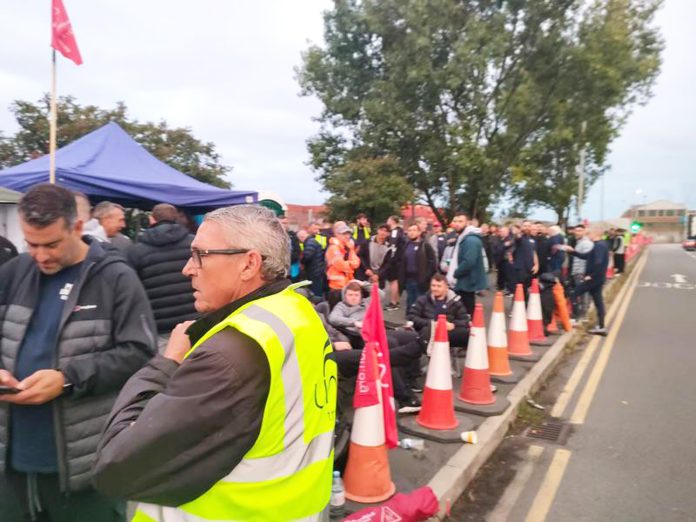Dave Walsh, Liverpool Socialist Party
Liverpool dockers voted for strike action over pay and conditions, with a turnout of over 90% and a vote for action of almost 100%. They embarked on a two-week strike after the Queen’s funeral, following a 7% pay offer, which in reality amounts to a considerable pay cut.
It is the first strike action there since the bitter, long-running dispute which lasted 28 months from 1995-98.
John Lynch, one of the senior stewards, reported to Liverpool Trades Council that the dockers are bitter and angry after years of exploitation. That is especially after working through the pandemic, during which time shareholders received huge dividends and bosses got massive bonuses, while workers have had a derisory offer, nowhere near the rate of inflation.
During the 1990s dispute, Tony Blair’s New Labour won the general election. That government had a ‘golden share’ in the Mersey Docks and Harbour Company, but refused to use it to support the dockers, who had been ruthlessly sacked by employers hell-bent on breaking the union.
The dockers were also let down by Blair’s close ally Bill Morris, now a Lord, then leader of the Transport and General Workers Union (TGWU – now part of Unite the Union), who failed to organise any industrial support. But the dockers themselves built up tremendous international support, which helped sustain their strike for so long.
International support
Those international links still remain, and leading stewards from the original dispute, like Tony Nelson and Terry Teague, have been working closely with the current strike leaders to contact union comrades from around the world. The International Dockers Committee and the International Transport Federation are both committed to not moving goods coming from or going to Liverpool.
At the same trades council meeting where John reported on the dock dispute, we also heard reports from strike leaders in civil service union PCS, about the dispute of workers in the contact centre for DBS criminal record checks, and the CWU about the BT, Openreach and Royal Mail strikes. They all made a call on the Trades Union Congress to coordinate these and other actions to maximise their impact.
In 1995, the Liverpool dockers were left isolated by a Labour government and poor trade union leaders. In contrast to this, John reported that they were receiving tremendous support from Unite general secretary Sharon Graham, and are feeling far from isolated following Unite’s many victories under her leadership.
Dock workers at Felixstowe are striking again from 27September, coinciding with the Liverpool strike. This action follows a two-week strike in August against the same inadequate pay offer.







